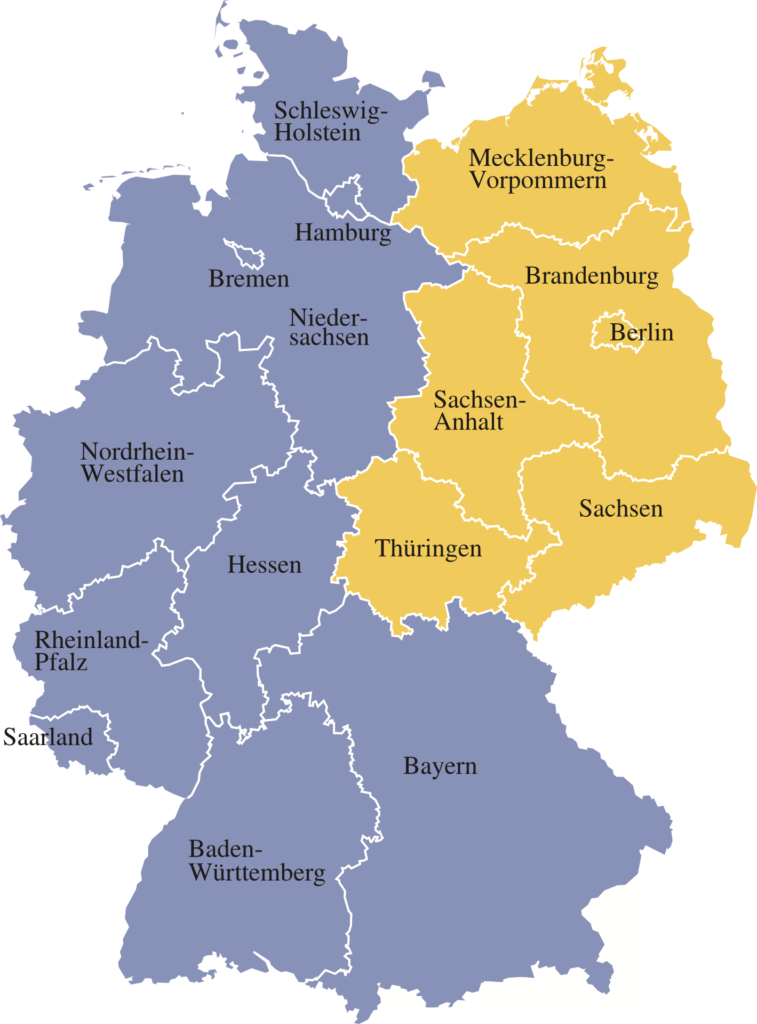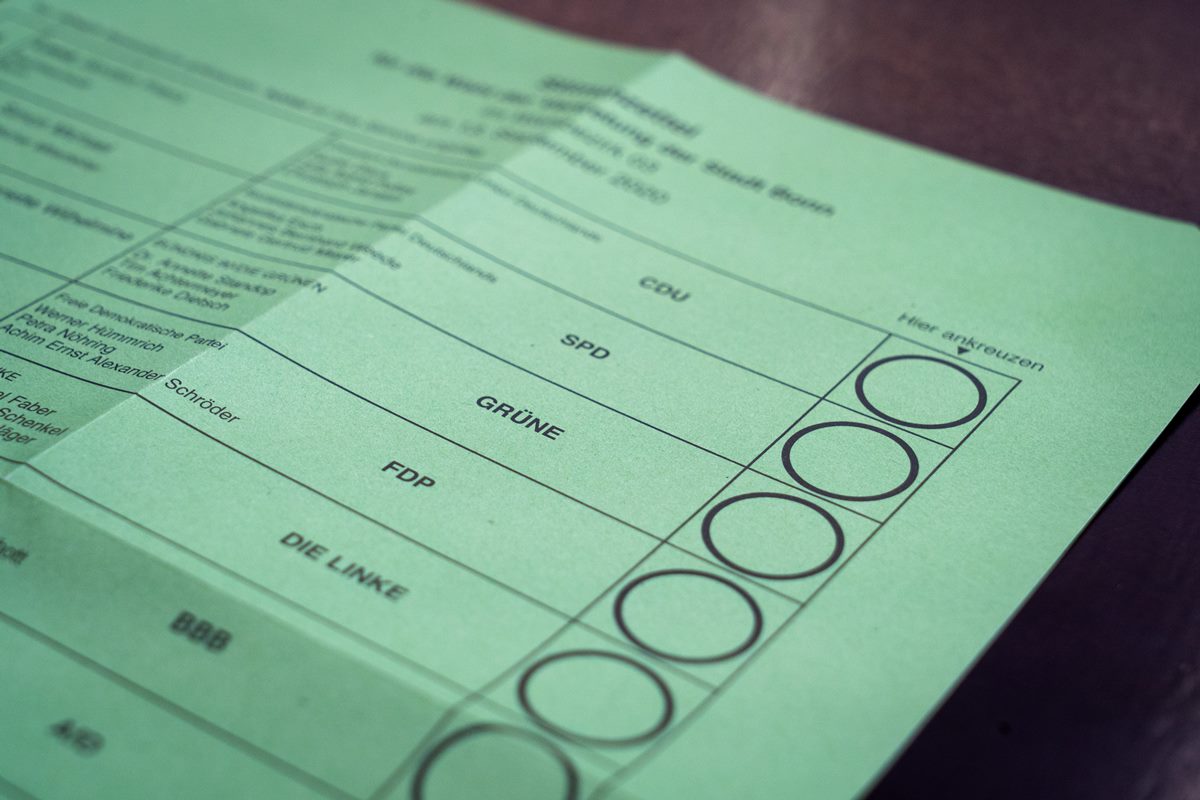Why 2021 Is a “Super Year” for Germany (a Superwahljahr) Posted by Sten on Mar 18, 2021 in News, Politics, Vocabulary
Germany is in a Superwahljahr (n, super election year). There is a Bundestagswahl (f, Federal Parliament election), sure. But wouldn’t that just make it an election year? What’s super about it?
Elections, elections, elections!
Germany is a federation, like the United States. This means that each of the 16 German states, called Bundesländer (n, “federal countries”), has its own state parliament as well, called Landestag (m, “country parliament”). These state parliaments are elected in a Landtagswahl (f, Landestag election) by the people that live in the Bundesland.
But not only Landtagswahlen can lead to a Superwahljahr. Also a large number of Kommunalwahlen (f, local elections) can be the foundation for such a super year.
When there are many Bundesländer that have their Landtagswahlen or Kommunalwahlen in the same year, we’re getting close to a Superwahljahr.
There is no strict definition with how many Wahlen (f, elections) a year becomes a Superwahljahr, but a common theme is that at least one election needs to take place in which all Germans get to vote. This can be the Bundespräsidentenwahl (Federal President election) or the Bundestagswahl or just the Europawahl (European elections), in which the German representatives for the European Parliament are elected.
With so many elections, you might think that such Superwahljahre are quite common. But they are rarer than you might think. Since the Legislaturperiode (f, legislative period) for each Bundesland starts at a different time and have different lengths, a Superwahljahr does not always happen.
So far, Germany has had Superwahljahre in 1990, 1994, 2009, 2011 and this year, 2021.
This year is marked by the Bundestagswahl in september, in which Bundeskanzlerin (Federal Chancellor) Angela Merkel is not going to run again. After 16 years of Angie, as she is sometimes called, a change might be coming to the German government. Besides that, there are several Kommunalwahlen and Landtagswahlen this year. For all Termine (m, dates), take a look at this website. The Landtagswahl in Thüringen (Thuringa) of April 25 was cancelled due to the Coronavirus (m/n1TWO articles? Yes, this happens sometimes in German. We wrote a post about it), coronavirus). Most likely, that Landtagswahl will now be held on the same day as the Bundestagswahl.
Austria also has the concept of the Superwahljahr, with one in 1994 and 2009. And fun fact: das Superwahljahr was chosen as Wort des Jahres in 1994!
The official Superwahljahr kick-off!
This past weekend, the first elections in the Superwahljahr were held. This is coined as the Start in das Superwahljahr 2021 (start into the super election year 2021). With Landtagswahlen in the South of the country, Baden-Württemberg and Rheinland-Pfalz elected new state parliaments.
Why is this a big deal, you might say? What makes this year different, just because there are many Wahlen?
The elections before the Bundestagswahl are often seen as a way to gauge the Stimmung (f, mood) in the country. Are there big shifts in preferences in a Bundesland? That might also reflect a preference in the federal elections. This makes the whole year more exciting!
Think of it as the US Election Day but drawn out over an entire year. Every time a (swing) state is called, it sets off discussion and speculation for what’s to come.
This is even more real in Germany, where this discussion comes weeks before the next election sometimes, so the outcomes could actually influence what BürgerInnen (m, f, citizens) elect in their Landtagswahl or in the national election.
With the results of these first two elections, a lot of speculation already started. While not a lot changed, there were some surprises. Merkel’s party, the CDU, had some of its worst results in both Bundesländer ever, while the contentious AfD lost some seats too. Overall, the Grünen (Greens) got the best results, with better results in both Bundesländer. Even smaller the liberal party, the FDP, gained some seats. This started a discussion that the CDU/CSU might not be the biggest force this time around in the Bundestagswahlen. Perhaps the Grünen could get a federal victory, too? It remains to be seen!
What do you think about the discussions around the meaning of these elections for other elections? Are you voting in any of these elections? I’m curious, so let me know in the comments below!
- 1TWO articles? Yes, this happens sometimes in German. We wrote a post about it)

Build vocabulary, practice pronunciation, and more with Transparent Language Online. Available anytime, anywhere, on any device.






Comments:
Harry:
Very formative article. I’m British and cannot vote here in Germany, my German wife can. The voting form is astonishing, at least 30 people that must be selected, of which 27 are completely unknown to almost everybody. A case of too many, not required political
people. Is this the case around Europe???
Keep up the good work.
Harry.
Sten:
@Harry Hi Harry!
It is astonishing indeed, but even more so in the Netherlands! I wrote a post about that process on the Dutch blog, here:
https://blogs.transparent.com/dutch/how-the-dutch-elections-work/